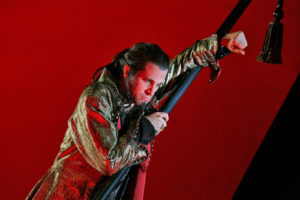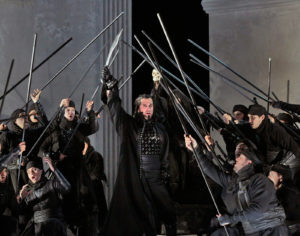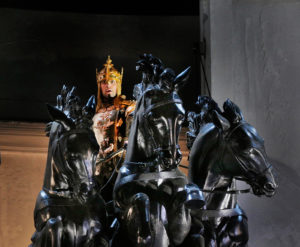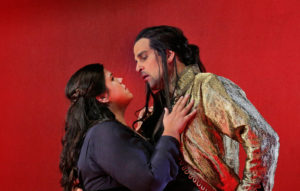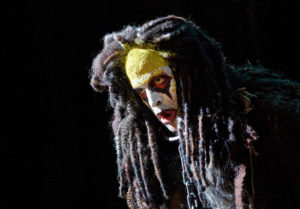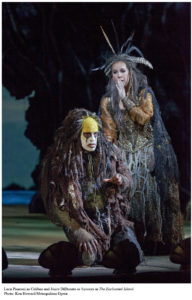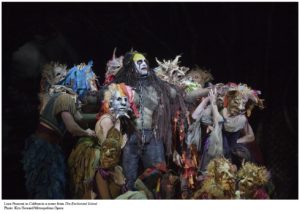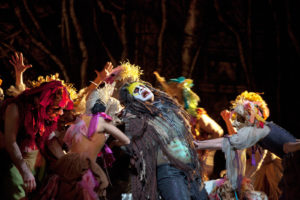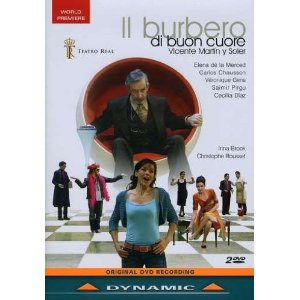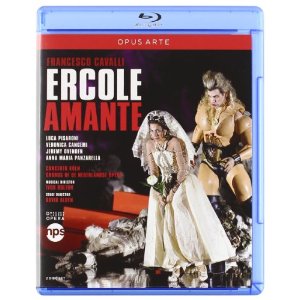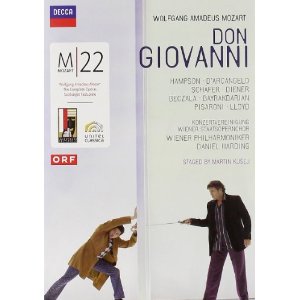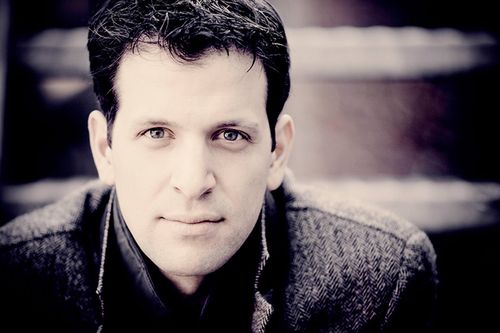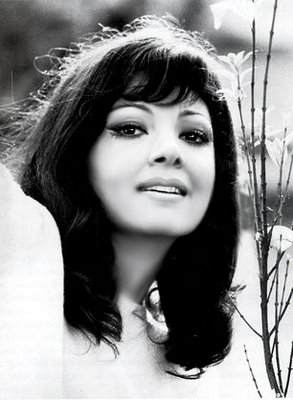Opera Lively Exclusive Interview with Luca Pisaroni
On the occasion of Luca Pisaroni’s current appearance in the title role of Santa Fe Opera’s historical production of the world premiere of the new critical edition of Rossini’s Maometto II, and also in the recent wake of his outstanding performance as Caliban in the Metropolitan Opera pastiche The Enchanted Island, Opera Lively interviewed the brilliant bass-baritone, arguably the best one of his generation.
The Complete Opera Lively’s Exclusive Interview with Luca Pisaroni:
OL – We are very interested in the current world premiere of the new critical edition of Maometto II in Santa Fe. We’ve just interviewed young and promising soprano Leah Crocetto who will be with you in that production, as well as Dr. Philip Gossett who is the Rossini scholar advising Santa Fe Opera. Can you tell us more about this production that is about to have its premiere?
LP – Maometto in Santa Fe is a dream come true. Since I heard Sam Ramey sing Maometto at La Scala in 1994, I hoped I would get the chance to sing this role one day. So when Santa Fe decided to put this piece together, I was delirious. The Santa Fe Opera put together an incredibly talented cast, with Leah [Crocetto], Patricia [Bardon] and Bruce [Sledge]. I am sure people are going to be really excited about this production thanks to the vision and support of David Alden and Frédéric Chaslin.
It has been a privilege for me to be part of this project. It’s a huge challenge! This score is difficult for everybody – for the tenor, for the mezzo, for me, for the soprano. It’s incredibly demanding, but we all love it. Tomorrow is the dress rehearsal and we are really putting all of our energies into it. We are excited about presenting this opera to the audience. Maometto II was only done once in San Francisco in 1988, so there is an entire generation of Americans who never had a chance to see this masterpiece.
OL – How was your process of preparation for it?
LP – The process has been really interesting because I was in constant touch with Philip Gossett while he was preparing the critical edition. I had an old score and it was full of mistakes. When I was in Chicago for Rinaldo I had a working session with him, and we went through the opera. There is no one who knows more about Rossini than Philip Gossett. I wanted to pick his brain in terms of style, variations; I really wanted to give dramatic meaning to the coloratura and not just show what I can do with my voice.
OL – Were you aware of the importance of a critical edition? This is something that I just realized after I interviewed Dr. Gossett. It seems to me now that it is very essential, and I wasn’t aware, when I attended an opera or purchased a CD or DVD, of the importance of checking out what edition was used. Are singers generally in tune with this, or rather oblivious to it? When you’re hired, do you generally just get from the opera house whatever material they’ll be using so that you study it, without any say on the edition chosen?
LP – This is the first time I am doing an opera based on a brand-new critical edition. It’s exciting.
OL – Do you think it makes it much better?
LP – It makes a difference. I think we ought to gather all the information about the piece and put it out there. Theaters can then choose the version that they like best or the different cuts that they want to do, but at least the material is out there and we know the intentions of the composer. It’s an incredible valuable piece of research.
OL – Tell us about Mr. David Alden’s concepts. Can you describe to us the solutions he found to the more striking issues while staging this opera? Any info on what he’s been telling the singers? How is it to work with him? Is he a “singers” director?
LP – I truly enjoy working with David Alden. He is not only a gifted director, but also a musician; he knows every single word and he finds the dramatic motivations in the music, which I adore.
There is a wonderful connection between the music and the staging because one complements the other. I like the language he chose for this production; it is modern and exciting. It’s going to be a really powerful theatrical experience.
OL – Great. I’m excited about it, and looking forward to it. And what about the set design?
LP – The set is abstract. It is not literal. It is a wonderful set, the space that is being created is incredibly useful for the singers. With the lighting, it’s going to look really stunning.
OL– What are the vocal challenges you encounter while singing the role of Maometto? Be technical and specific if you will; tell us about the most challenging arias and why they are difficult, please.
LP – Maometto is one of the most difficult roles that Rossini wrote for bass-baritone. It requires a solid technique. It requires you to have a very even voice, low notes, coloratura, legato, top notes, there is everything there, that’s why I’m so excited to do it. We decided to do this at the end of 2008, beginning of 2009, and I started working on this immediately, because I knew that this was very challenging. You need to work on it, let it settle in your voice, go back to it and work on it some more.
I coached the role a lot and also met Sam Ramey to talk about it. Sam said to me, “when they called me to do this, I thought, why are there so many black notes?” Then I looked at the score, and said, “Jesus, why am I doing this???”
I had a very good process, with a lot of fantastic coaches, voice teachers, and people to whom I could ask questions, like Sam Ramey and Philip Gossett, who helped me to find “my” Maometto.
OL – How do you read the psychology of your character? He is a cruel man but portrayed by the Rossini and his librettist as a sympathetic character. Does this make of acting him a challenge?
LP – The character is complex. I don’t think that he is only the villain. In a way Anna is almost more extremist than Maometto. He is a warrior, a conqueror, he does what he does, but I can really tell that Maometto has a soft spot for Anna. He loves her and she makes him doubt who he is and what he does. When she betrays him at the end, he is in complete shock.
OL – Please tell us about working with Leah Crocetto.
LP – It is a pleasure to work with Leah. She is fantastic – a great colleague, incredibly talented and a wonderful singer. We had *the* best time. It was such a pleasure to work with her. She is such a nice person, which helps especially when you have a love duet to stage.
OL – How is it, to rehearse by brutal heat in the New Mexico desert? It’s an open air theater with a roof, but you can’t have air conditioning. Is it really hot in Santa Fe?
LP – The rehearsals are in the evening and it’s actually very pleasant here. You still need to be very careful because it is open air and it can be incredibly dry at times, but I love it. Santa Fe is such a unique place, it doesn’t get any better than singing with such a beautiful background. It’s fantastic.
OL – Can you tell us your impressions of Santa Fe Opera as an opera company?
LP – They have been very supportive and they know how difficult this opera is. They put us in the best position possible to do our best.
OL -Is there a DVD of this production coming?
LP – I don’t think there will be a DVD of this.
OL – Oh, pity. But talking about video media, let’s shift gears to some of your previous work. let’s talk about the Glyndebourne Così fan Tutte in 2006 conducted by Iván Fischer and directed by Nicholas Hytner, which was released on Opus Arte blu-ray.
This performance occupies a very special place among our readers and members, being repeatedly quoted in our forum and articles as a “must have” or “top five” blu-ray, and even being heralded as something that should be part of the curriculum in academic operatic departments, to teach young artists how to properly stage and perform opera. It is textbook-perfect in our opinion, with those gorgeous ladies Miah Persson and Anke Vondung, and you and Topi Lehtipuu adding great stage presence and comedic flair. The traditional but sleek sets were fabulous (not to forget the beautiful Neapolitan blue sky), and Mozart’s music doesn’t get played much better than by the Orchestra of the Age of Enlightenment. So, we’d love to know more about the ins and outs of that production from its initial concept to its realization. Please tell us some interesting facts about that experience.
LP – I’m flattered that you think that this is a must-have and that it is considered to be one of the best Così fan Tutte recordings out there. It was a wonderful experience. It was interesting for me to work with Iván Fischer; he is incredibly musical and he is a singers’ conductor. He worked the score in such detail – I really learned a lot from him! I’m very proud of the results, to be honest, both musically and dramatically. It was an incredibly stimulating process. And let’s not forget the rest of the cast – Miah, Anke, Topi – I really enjoyed working with them. I just think I had the best conditions to shape my portrayal of Guglielmo. Everyone in the cast was great and it pushed me to find new colors and details in the role. I enjoyed working there. When you do Glyndebourne and you have 16, 17 performances of the same role, one would think that after a while it gets boring, but actually for me every performance was like a premiere, it was really exciting.
OL – I’m under the impression that Glyndebourne is probably among the three or five best opera companies in the world. They do such good work in everything they present!
LP – Absolutely, they really do. They put a lot of attention into the musical preparation, which is really remarkable. After you debut a role in Glyndebourne, you can do it anywhere else in the world. It’s the amount of musical work you do while you are preparing the role that it’s going to make the experience truly fantastic.
OL – I’ve just interviewed Anna Caterina Antonacci [click here to read it] who said that Glyndebourne rehearses a new production for at least two months.
LP – I did five and a half weeks of rehearsals at Glyndebourne. It is not just the number of weeks you rehearse; to me it’s about the quality of the rehearsal process. Sometimes you have three weeks – but it’s incredibly intense; sometimes you have six and a half weeks and it’s a waste of time. It really depends on the opera, the director and the cast.
- The Enchanted Island | The Metropolitan Opera | Photo: Ken Howard
OL – In the same vein, the entire operatic world was mesmerized with the recent pastiche created modernly at the Metropolitan Opera House over baroque music – The Enchanted Island. I personally confess that this was one of the most entertaining afternoons for me in recent memory, when I saw the Live in HD broadcast. Your performance there was unbelievably good. I’d imagine that being part of this initiative was quite fun! Any comments?
LP – I was so excited when they asked me if I wanted to be part of this project, that I said “yes” before they could even finish the sentence. I love challenges. I thought that this would be an interesting challenge for two reasons; one, it was in English, and two, because it was a world premiere. I was part of the creative process of actually choosing the music. This doesn’t happen that often, you know… In a way it was almost like having the composer there with you. I have sung quite a bit of Baroque repertoire, but The Enchanted Island was a very special project. I found the story to be very engaging and the music is fantastic. I loved the production. It was, without question, one of the best productions I’ve ever done in my life. My costume was simply out of this world. Working with people like Joyce DiDonato, Plácido Domingo, David Daniels, Danielle De Niese; it was just a joy to do it.
The process wasn’t always easy for me. The piece was new and the first week of rehearsal felt a little bit like we were all testing the waters. We didn’t know how our roles or the production would develop, but Phelim McDermott’s theatrical approach helped us all to create something very special. It was such a pleasure to work with such wonderful colleagues and be able to develop a character that nobody else had done before. It was really incredibly exciting for me.
OL – And how do you see the Met’s vision in bringing to the audience this kind of innovative approach – merging modern fun with sublime old music to make something that is not only achingly beautiful, but wickedly funny? Is this a good way to bring the younger demographics to opera?
LP – I think it’s a great way to bring younger audiences to the opera. The Enchanted Island has everything – it was funny, and yet at times very moving. One of my favorite scenes was Joyce’s last aria in which she consoles me – she sang it beautifully and it was heart-breaking. I cried every night and this is what opera is about, it’s about life, it’s about emotions.
- The Enchanted Island | The Metropolitan Opera | Photo: Ken Howard
OL – Very good. Now please help us settle a controversy between our members about Vicente Martín y Soler’s Il Burbero di buon cuore, of which you also have a Dynamic label DVD in the role of Dorval, at Teatro Real, with Christophe Rousset conducting, and Irina Brook directing.
Some of us – me included – consider this piece to be a hidden gem of Mozartian proportions, while others see it rather as a nice but minor work. What is your opinion of this opera musically and dramatically? This Teatro Real production was updated; what did you think of the staging and what else can you tell us about that initiative of reviving this more obscure repertory?
LP – I really applaud an opera house that actually tries to discover new repertoire. We can’t just listen to the top-10 operas every season. In fact it is much more interesting to have a diverse repertoire. Maybe not all operas are masterpieces, but this helps you to get an idea of what was going on in the period of Mozart, of Händel. It absolutely makes complete sense to discover this opera.
OL – Do you find this one to be particularly good?
LP – I don’t find it to be a masterpiece. Not every piece is as genius as Don Giovanni or Le Nozze di Figaro or Così fan Tutte. Some operas were very popular at their time but they seem less exciting today. If you compare this piece to Mozart’s operas, you realize how incredibly innovative Mozart was. That’s why I think it is interesting to see these pieces. I really applaud a theater like the Teatro Real that decides to rediscover this unknown opera, because until then nobody remembered Il Burbero di Buon Cuore.
OL – Oh, bummer, I’m on the losing side of this argument, then, because I was one of those who thought that it was a masterpiece (laughs). Anyway, as a follow up to this, how do you feel about updated stagings?
LP – Look, I’ll repeat the same thing I always say, which is – I don’t mind updated stagings, I think it’s all about intelligence. If a production is intelligent, an updated staging can work very well. I just don’t like stupid productions, I have an issue with that. To me, to play Don Giovanni in a period set or not doesn’t really matter that much – I’m more interested in the interactions and relationships between the characters. That’s much more relevant than whether I am wearing a period costume or jeans. Perhaps there are younger audiences who find it easier to relate to a production that it’s been updated, but period opera can be magical as well. When you do a production like the Nozze di Figaro by Jonathan Miller, which is almost twenty years old, it is so brilliant and intelligent that you actually forget that you are wearing period costumes.
OL – And what about Regie concepts that change an opera dramatically?
LP – I have an issue with that. Because taking an opera that was composed 300 years ago and trying to push it into a box because you want to make it “relevant” for today’s audience doesn’t make sense. If you use the opera to say what YOU want to say even if that has nothing to do with the opera and does not related to the piece itself, then I have an issue. If you want to do that, then, write a new opera!
OL – Agreed! – We’ve also noted your Cavalli work in Ercole Amante. While a Handel revival has been in full force for a while, audiences have only recently started to rediscover Vivaldi’s operas, much less Cavalli’s. Singers like you, Vivica Genaux, and Philippe Jaroussky have been instrumental in highlighting this early Italian baroque repertory.
LP – When they asked me if I was interested to do Ercole Amante, I said “absolutely.” I thought David Alden’s staging was brilliant. To set this opera in old Latin historical periods would be laughable nowadays. So, this is an example of an updated production that really worked. I loved it and I thought that the audience enjoyed the rediscovery of that piece that was incredibly modern for the period; Cavalli did an incredible job there. It’s fantastic that an opera house puts so much effort into rediscovering an opera that is almost forgotten. I was happy to be part of this project.
OL – Could you please tell us more about other parts of this repertory that may be extremely valuable and be awaiting rediscovery? Do you have any plans to do more Cavalli (are there good operas by him worthy of a revival?), or some Vivaldi?
LP – To be honest with you, I find the Baroque very interesting both dramatically and vocally, but it is something that you need to let go after a while, if you want to develop your voice to do a certain “heavier” repertoire. Many Baroque singers only sing Baroque and this is not what I want to do. I enjoyed doing Baroque; I did Rinaldo, Giulio Cesare, Ercole Amante, Radamisto, and I did Ariodante but there is a moment when you say “if I want my voice to develop I need to explore other repertoire”.
OL – You were also in Don Giovanni at Salzburg with your father-in-law Thomas Hampson, in a performance available on DVD in the M22 series. Mr. Hampson has expressed reservations about that DVD, and would have preferred that the previous run of the same production had been preserved, for various reasons (unrelated to the singers).
LP – There was a very special energy in the previous runs (2002 and 2003) and it was just different in 2006. This Don Giovanni in Salzburg was a turning point for my career. I was studying in the Conservatory in Milano when I auditioned for Harnoncourt and he asked me to sing Masetto. It was actually the beginning of my career; working with Thomas and a conductor like Harnoncourt was a dream come true. I learned so much in that year in Salzburg because the cast was so fantastic; Ildebrando d’Arcangelo, Melanie Diener, Anna Netrebko, Thomas… I was 26 and right out of the conservatory; can you imagine how thrilling this was?
OL – His reservation was just that Maestro Harnoncourt was not as involved that time as opposed to the previous performance.
LP – I am sorry that the recording of Don Giovanni did not happen with Harnoncourt conducting, because Martin Kusej’s production was made for Harnoncourt’s tempi and his musical ideas. His reading of Don Giovanni was earth-shattering, so different from everyone else… Harnoncourt’s tempi, especially the finale of the second act, were just unbelievable. The tempi worked so well with the staging. I really regret that Harnoncourt was not part of the recording, because the project was born and nurtured by him.
OL – But anyway, how was for you the experience of working with your father-in-law? Now you’ve just been in concert together. Mr. Hampson is such a talented singer and a scholar of the operatic field. Is working alongside him by any chance intimidating? How is your relationship with him; has he mentored you a lot?
LP – The relationship with Thomas was fantastic from the beginning. I was and still am incredibly respectful of his career, and I remember asking questions every other day, and I probably got in his nerves, but when you get a chance to work with such a wonderful musician and singer like Thomas, you need to ask questions and try to learn from him as much as you can.
OL – Training with Carlo Bergonzi must have been quite an experience. Any interesting memories to tell us regarding the great singer?
LP – I did not technically train with Bergonzi, because I was too young. I sang for him when I was 13 or 14 and he told me to wait until my voice would change and I would be able to start singing. While I did not technically work with him, I listened to his teaching almost every afternoon, and this really taught me a lot in terms of diction, phrasing and how to use your voice to communicate to an audience. I consider him one of my teachers because of that. The way he sang, phrased and used his instrument was unbelievable. His approach on singing was unique and made him one the best Verdi tenors.
[Click here to listen to the great Carlo Bergonzi sings “Una Furtiva Lagrima” from Donizetti’s L’Elisir d’Amore, at the end of his career and with a wide vibrato, but still showing the beautiful and expressive Italianate phrasing that Luca made reference to]
OL – Just as thrilling must have been for an opera-loving boy (at age 14, you trekked over 125 miles to Turin in order to see a double-bill of Cavalleria Rusticana and Pagliacci; you were back home at four o’clock in the morning and got up two-and-a-half hours later to go to school) to have been raised in Busseto, the great Verdi’s hometown. We are curious to know how the inhabitants of that town uphold the legacy of their illustrious former resident. Is opera more popular in Busseto than in other parts of the world? Is Verdi’s music part of the everyday fabric of life in Busseto?
LP – I grew up in a region where you eat and breathe opera. Opera is definitely part of every day’s fabric of life in Busseto because it is all around you. Do I think that they do everything to keep Verdi’s wonderful heritage alive in his hometown? Not at all. Do I think that they put all possible efforts into having a festival that honors Giuseppe Verdi? No, unfortunately it doesn’t happen, because of economical and political reasons and it is very sad. But honestly I grew up listening to opera because it was all around me. I started when I was nine years old, and it was love at first sight, and I have loved it eve since. I consider myself lucky.
OL – Any other important events in your childhood that drew you into opera?
LP – Opera has always been my best friend. I did not have many friends when I was growing up. I liked opera and that made me kind of unpopular.
OL – Really? (laughs)
LP – Yeah, don’t forget it’s Italy, it’s all about football! You are 13, 14, everybody wants to play football and be a football player, and I wanted to be an opera singer. I thought Pavarotti was incredibly cool, but most of my friends thought opera was boring and lame. I didn’t care even then… there is something about music that speaks to me and I’ve known that all my life.
OL – Were your parents opera lovers?
LP – No, they were not. The only opera lover was my grandfather who had a collection of Verdi arias: I listened to Boris Christoff singing “Ella giammai m’amò” and in that moment I was fascinated by the possibility of producing such sounds with the voice, and that was it.
OL – Are you planning to attend the events of the Bicentenario in 2013?
LP – There is a project to sing a Verdi concert in Busseto with my father-in-law in 2013 as part of the Bicentenario. It will be fantastic.
OL – Wow, I’ll see if I’ll go and attend!
LP – Yeah, it will be in June 2013, I really hope it happens.
OL – Was your birth in Venezuela of consequence in terms of cultural heritage? Probably not, given that you moved to Italy at age 4, but still, sometimes and from the symbolic standpoint, one looks at one’s place of birth at least with significant interest. Is it your case?
LP – No, I was born in Venezuela by chance because my parents lived there for ten years. I was 4 when we moved back to Italy, so Venezuela has absolutely no impact on my artistic development.
OL – In any case it seems that you also lived in Argentina, right?
LP – I spent a year in Argentina when I was twenty. I worked with the Argentine tenor Renato Sassola whom I had met in Milano and I decided to move to Buenos Aires to work with him. It was important for my career because it really changed the way I sang. I quit the Conservatory in Milano because the voice teacher there was not very good for me. My voice did not sound the way I envisioned it, so when I met Sassola, I took a chance and went to work with him. It was difficult because I was all by myself and I spent the whole week studying, nothing else. It was the right decision to go. I may not have a degree from the Conservatory in Milano, but I learned how to sing. A pianist friend always told me, “when you sing well, no ones cares who your teacher is.” It was a very good advice.
OL – Are you planning to move your career to a different repertory than your current one? With some more natural voice development, are you planning to one day sing Verismo, Verdi, Puccini, etc? Or would this be risky for you?
LP – I would looooove to move to a different repertoire and I’m slowly doing it. Maometto II in Santa Fe is certainly a bold move in terms of repertoire. I want to add more Rossini and I’m adding Anna Bolena, Faust, I Puritani. I want to do it slowly and make sure that I’m not damaging my voice: that’s the main thing. I believe that you need to leave your voice alone, I mean, you need to allow your voice to develop naturally. I don’t want to push the voice anywhere: I want to allow my voice to go where it wants to go. When I work with my teacher, we work on letting me sing with my own voice. I want to add different repertoire but I’ll still work with *my* voice, leaving my voice as natural and free as possible. In what direction is my voice going to develop? I don’t know, and this is going to make things even more interesting. I want to be surprised by my own voice, to see where my voice takes me.
OL – Luca, are you OK with the time that the interview is taking?
LP – Look, you’ve been very patient and I’m giving you all the time that you want.
OL – Good! So, let’s go to the next question. As far as contemporary opera goes, you’ve only sung Stravinsky. Are you interested in contemporary opera?
LP – I’m interested in contemporary opera. I was supposed to sing in Corigliano’s The Ghosts of Versailles at the Met in 2010, but they had to cancel it. I was really, really disappointed. I would have loved to do it. I was to be Figaro in that version; it would have been very interesting. I have not been asked to do contemporary opera as much as I’d like to, because it is nice to be part of such a project. There are lots of interesting composers out there.
OL – It’s often said that for a young singer, it can be dangerous to your voice to sing big roles in big houses too early in your career, and in fact you took a year off after studying at the conservatory to continue studying rather than accepting offers you had at the time. On the other hand, once you did start your career your rise to fame was relatively fast — going from singing your first role on stage to getting an offer from the Met for Figaro (in Nozze) in 2 years. How much did that year off help you prepare for singing at the Met? In retrospect, was it a good choice to sing at the Met relatively early in your career? Would you advise other young singers to follow your same path?
LP – Every singer is different and careers are different. There is no path set in stone for everybody. Voices mature in a different time, a different way, and careers also last a different amount of time. I’ve always wanted my career to last for 35, 40 years. I’ve always thought that the challenge and the beauty of a career is to be on top and sing what you want to sing for a very long time. You know, careers like Pavarotti, Freni, Cappucilli, Bruson, Domingo. I look up to these singers because singing major roles in major houses for 40 years is an incredible achievement.
I made my debut when I was 25. You should not make your debut until you know you can do your job well. I often see a young singer trying to sing a repertoire that is too difficult, too soon. I prefer to be a bit slower than to be too fast and then get burned. It takes very little for a career to go wrong. I always say, “take risks, do something that scares you, but always make sure that you are ready for it”. What you sing should not require 100% of your capabilities all the time, because especially when you are at the beginning of your career you cannot sustain that in terms of the technique, of the physical effort that you need and the pressure that everybody puts on you. At 40, 45, or 50 you have a bag of tools in terms of experience, technique and you know that you are capable of. That helps you get through some tough repertoire.
OL – We have recovered this fragment from another one of your interviews: “My ideal career is not typically Italian. I really love doing concerts and recitals and this is not really an Italian thing. Apart from Bartoli, there are not a lot of singers who do liederabends [song recitals], but I would die if I just had to do one opera after another. It just is not interesting. It’s better for a human being and for an artist to do a variety of things.” We’d like you to follow up on that, under the light of what one of your illustrious colleagues – Piotr Beczala – just said to Opera Lively in his interview with us – that he believes that focusing on opera and doing just a bit of recitals is more likely to take a singer into a more natural evolution for his/her voice. Mr. Beczala doubts that the variety of styles one needs to tackle in recitals will lead to vocal growth and a logical path for a voice, from lighter to heavier repertory. Any comments? And do you feel that recitals are especially challenging?
LP – Piotr’s opinion about recitals is *Piotr’s* opinion. I am a curious person. To go from one opera to the next would be boring for me. I learned many things from singing recitals: in terms of what to do with my voice, in terms of colors and dynamics, in terms of how to relate to an audience, in terms of how to convey feelings, in terms of how to paint a picture to the audience, in two and a half minutes, which is the time that a song lasts. That is a bag of tools that I bring back to opera and that helps me grow as an artist. Singing opera and singing recitals complement each other.
OL – To end on a lighter note, we have three questions that are not as serious as the ones we’ve just asked, if you don’t mind. One of our female staff members wanted to know what you think about what she calls the “barihunk” phenomenon – of which she says you’re a member (laughs).
- Luca Pisaroni credit Marco Borggreve
These attractive baritones (and some tenors too) may be the male counterpart to the phenomenon of very attractive sopranos and mezzo-sopranos who took the operatic world by storm. I’m myself rather confident that all of these artists who are in the eyes of the media right now in part thanks to their good looks perfectly hold their own in the matter of singing. While it is conceivable that one may have an easier path to the top if one is genetically blessed with good looks, in my opinion one doesn’t *stay* on top based on looks only. But it is undeniable that the era of blu-ray and Live in HD brought looks to the front of the considerations of opera house managers and became a huge asset (or impediment) for a young singer to have a chance at a great career. Any comments?
LP – I am flattered I am featured on the Barihunks website from time to time. These guys help spread excitement about this art form we all love so much. I just think that our society has become more and more visual, so people think that it is important how somebody looks, and opera has been affected by this too. People like to see pleasant-looking people on stage, and believable characters. In a way this has never been any different. If I look at singers in the fifties, I don’t see where this idea of fat singers comes from.
OL – Yes, there were beautiful singers in the past, like Anna Moffo.
- The beautiful Anna Moffo – singers of the past were also pretty
LP – Yes, Corelli, Del Monaco, Tebaldi, Callas, Simionato, and many many more. People say that singers of the past were fat and just “parked and barked”. I completely disagree. There have always been many beautiful and slim singers. I believe it’s the combination of your voice and your acting skills that makes things memorable. There are singers who are incredibly pretty but are not that good on stage, and there are people who maybe are not as good looking but are incredibly engaging and have huge charisma and when you see them on stage you think that they are the most beautiful singers you have ever seen. I pay attention to my body – it’s a simply matter of health.
OL – Feel free to skip this next question if you don’t want to cross that line. Some of our interviewees don’t mind a more personal approach that gives to an interview a more humane dimension; others are only willing to talk about the operatic field and prefer to shield their personal lives, understandably – so feel free if your style is more the latter than the former, to just say “I don’t want to reply to this question”. But here it goes: is there an interesting story that our readers might enjoy, if you were to tell us how you met your wife – being her the daughter of a very famous singer, Thomas Hampson – and how the two of you fell in love?
LP – Catherine and I met in Salzburg in 2002. I was singing Masetto, and she came to see the rehearsals and to spend time with Thomas. We started talking and we immediately liked each other, and ten years later here we are. We both invested a great deal of energy in our relationship, especially at the beginning. I was just starting my career and Catherine was studying in New York. I consider myself incredibly lucky that she is my wife and that she can work on the road [Luca’s wife is a web designer who does websites for opera singers]. She follows me 95% of the time, and the good thing is that she is in the business but she is not a singer, which is the perfect combination.
OL – Is she in Santa Fe?
LP – Oh yes, of course, she’s always with me. Especially when I spend such a long time in a city for an opera production… I have to say, it’s really nice for me to have her with me most of the time. I was somehow adopted by Catherine’s family, probably because I’m a singer as well… Thomas really cares about my career as I care about his career, and it is nice to be part of a family that shares such deep care for each other; I consider myself very lucky.
- Yes, the dogs are in Santa Fe! Lenny 2.0, and Tristan
OL – Do you have children?
LP – No. We don’t have children.
OL – But you have dogs. They have unusual names… tell us more about them!
LP – We have two dogs, a miniature dachshund, Tristan, and a golden retriever, Lenny 2.0. Lenny’s name comes from Leonard Bernstein, because of the great friendship and connection that Thomas Hampson had with Leonard Bernstein, and we decided to call the other one Tristan because he has the personality and the voice of a tenor.
OL – Are the dogs in Santa Fe as well?
LP – Yes, they are with us. It’s nice to have the dogs, because they give me a sense of family, I feel at home everywhere I go. My wife is with me, the dogs are with me, and we have great adventures together. Dogs make life more fun… whenever we have some time off we go for walks, go swimming, spend mornings of afternoons on the beach. The dogs keep me healthy and happy and I’m most grateful for that.
OL – Great, these were the questions we had.
LP – Thank you so much.
OL – I look forward to meeting you in person in Santa Fe to shake hands. [Which, later, I did – and the singer is just as pleasant and friendly in person as he was in this interview, not to forget the enormous charm and sympathy of his wonderful wife]
LP – Me too. Take care, see you soon, bye bye.
OL – Bye.

